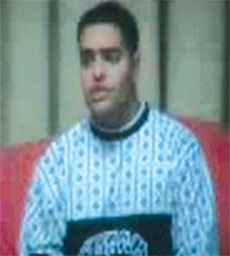
|
 |
 |
|
|
|
|
|
|
|
|
|
|
|
|
|
|
|
|
|
|
|
|
|
|
The Government Says it is Committed to Legal ProceedingsBroadcast Confessions of Hujjaira Detainees on TelevisionIt was officially announced last December that a terrorist cell was discovered while plotting bombings aimed at disturbing peace and killing innocents. The authorities first detained two people then the number increased to 14, and has now reached 20. Official statements and Interior Minister Sheikh Rashid bin Abdullah Al Khalifa announced that two Bahraini citizens residing in London are the masterminds behind the plot, and that the accused had travelled to Syria in July and August where they met with one of the orchestrates of the plot, and had received extensive training in the use of explosives and bombs in the town of Hujjaira, near Damascus. The Interior Minister added on 27/12 that the plotters were planning to smuggle large amounts of weapons into Bahrain in order to cause considerable damage and that all the detainees have admitted participating in this destructive plot.
On the other hand, the governments' handling of the arrests has sparked controversy amongst lawyers and human rights activists who have accused the authorities of bypassing the law and committing unconstitutional acts. The debate has become even more heated after the government's official television channel broadcast the taped confessions of the accused in a special program on 28/12. These detainees had until then been in solitary confinement and had not contacted any lawyers. They presented details regarding some of the accusations levelled against them and confessions regarding their intention to attack commercial centres and police stations etc. The lawyers of the detainees have criticized the broadcast. Lawyer Mohammed Ahmed said that it contradicts the country's constitution and contrary to the Penal Code (articles 245 and 246 paragraph 5) where it is explicitly stated that it is illegal to broadcast any confessions before trials are completed. Mr. Ahmed also announced that the Committee for Defence of the Detainees has made a legal complaint to the Supreme Judicial Council against the Public Prosecutor for giving its permission to broadcast the confessions and also against all those who contributed to the broadcast, including state television. He also commented on the Public Prosecutors' justification for the broadcast, in a statement, which stated that the reasons for broadcasting the confessions was in order to reassure the general public) saying that the broadcast had left a negative impression on the public against the accused, and that (the Prosecution acknowledges that it has tried to influence public opinion, including the judge,, which makes the punishment severe, while the mere publication of the names and images is a crime punishable by law). (Al Wasat, 15/1/2009). The human rights activists Nabeel Rajab, from the Centre of Human Rights and Dr. Abdullah Drazi, Secretary General of the Human Rights Society, said that the authorities have violated the detainees' rights and that in addition to violating international standards [for fair] trials, they have also violated Bahraini law itself which prohibits the publishing of any details of cases before investigations are complete. Dr. Drazi said that television confessions do not have value, being broadcast and published before the trial. He added that despite his support for the government in its quest to ensure the safety of citizens, however, the way of handling the case included violations of human rights. Due to mounting criticism, the Interior Minister Sheikh Rashid bin Abdullah Al Khalifa expressed his willingness to discuss the matter and to listen to other opinions, stressing that no one wants the situation to become even tenser, nor for these acts to reoccur. He also added that skeptics and those who adopt different legal interpretations of the events should not forget that if the plot had succeeded, many innocent lives would have been lost, and continued by saying that all the measures that were taken were in accordance with the law, and will always be so. On the other hand, confessions aired on television resulted in a split in views among members of Parliament (MPs). While some MPs saw the necessity of issuing a joint statement against the accused, and standing with the government in their actions, others felt that the accused are still innocent until proven guilty by the court, according to the Constitution and, therefore, must wait and preserve standards and values of justice, and not to ignore the principle (the separation of powers). The authorities claim that they possess substantial evidence supporting the allegations against the detainees, and this is something that no one can deny or approve, for this is a purely judicial issue, which should be neutral and not influenced by the remarks and statements published on the pages of many local newspapers. What matters after all is the integrity of legal proceedings, as to how the arrest takes place, and not to abuse or torture detainees, or to deprive them of their rights to contact their families and to meet with their lawyers. There is one last issue that should not be overlooked by any human rights observer of the 'Hujjaira case' as it is now called, which is that broadcasting confessions represents a violation of the law and could hamper the course of the investigation because it has invited more questions than it has given answers. |
